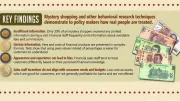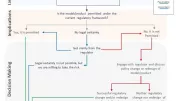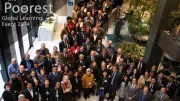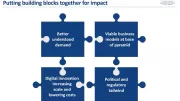Recent Blogs
Blog
Financial Consumer Protection: 5 Lessons from Behavioral Research
The boom in behavioral research methods means that gaining a deeper, more evidence-based understanding of how actors in a financial market behave, what incentives drive them, and what new policies or products can lead to responsible and inclusive financial systems.Blog
What Next for Remittances and Money Transfers in the Pacific?
There is a risk that recent progress in the Pacific region to drive down the cost of remittances will be undone, as money transfer operators are facing increased regulatory pressures.Blog
Postal Savings Bank of China: Inclusive Finance in Rural China
The Postal Savings Bank of China has five advantages over the "big 4" commercial banks when it comes to serving the rural population.Blog
Balancing Regulatory Uncertainty in Branchless Banking Design
For providers of mobile money services looking to navigate complex regulatory environments, there are valuable lessons that can be extracted from failed experiences - which can sometimes be traced back to challenging legal environments.Blog
Branchless Banking in China: Will Regulation Support Innovation?
China's pilot of 500,000 banking agents show significant promise for financial inclusion. Allowing these agents to offer a greater variety of services, such as taking deposits and opening new accounts, could lead to faster growth and more usage.Blog
Passing the Baton, but to Whom? Considerations for Investors
The number of exits from microfinance equity investments is anticipated to accelerate in the next few years because equity funds are maturing, MFIs are maturing, and social investors are moving on to new frontiers.Blog
Savers Deserve More Attention and Protection
Access to finance in the West African Economic Monetary Union and Economic and Monetary Community of Central Africa grew significantly from 2001 to 2011. However, more attention must be paid to savings and savers.Blog
E-Payments in Low-Income Settings: Cutting-Edge or High Risk?
Seen as having great potential for advancing the effectiveness of social and foreign assistance, e-payments can increase efficiency in a variety of ways. Four case studies take a closer look at programs in Haiti, Kenya, The Philippines and Uganda.Blog
Graduation Model: Ready to Scale Up?
The benefits of the Graduation Approach are clear. Optimism around this approach was reinforced in Paris last week when about 100 experts and policymakers discussed how to integrate it into other policies and programs.Blog
Graduation Programs as Part of Targeted Social Policy
After more than 15 years, conditional cash transfer programs have become the backbone of targeted social policies in Latin America. But we must create programs that maintain progress while continuing to move people out of poverty and into sustainable livelihoods.Blog
Private Sector Stepping Up Leadership in Financial Inclusion
On the sidelines of the World Economic Forum in Davos, some 60+ private and public sector leaders expressed their commitment to put the puzzle pieces for greater financial inclusion together for real impact.Blog
Prioritizing Complaints Handling with Third Party Ombudsmen
More and more countries are realizing the importance of establishing proper mechanisms for handling complaints within financial institutions and establishing proper external or third party recourse systems through ombudsman schemes.Blog
Nicaragua’s System for Resolving Financial Complaints
Nicaragua has made significant strides in consumer protection and financial inclusion since 2005, especially regarding its formalized complaints channel for credit card disputes.Blog
The Next Financial Inclusion Challenge: Private Sector Leadership
World leaders are embracing financial inclusion at an accelerating pace because they know it is an important ingredient for social and economic progress in developing countries. But despite the political tailwind, 2.5 billion people remain excluded from formal financial services. What needs to happen to meaningfully advance financial inclusion for the poor?Blog
Financial Inclusion, Stability, Integrity, and Consumer Protection
An inclusive financial system that reaches all citizens will have a more stable retail deposit base, which should increase systematic stability.Blog
Innovation in Person to Government Payments in the Philippines
Smart Hub Inc., has developed an epayment innovation in the person to government (P2G) space, called BayadLoad (bayad meaning payment in Tagalog), which attempts to empower more users in the Philippines to use digital channels.Blog
Understanding Microcredit Interest Rates in East Asia
While interest rates from MFIs are higher than state banks in EAP, with hundreds of millions of poor people without formal access, there is room for MFIs to expand as their services are often superior to other alternatives.Blog
Mobile Payments in Brazil: Ready, Set, Go?
The Central Bank of Brazil has issued the much awaited medida provisoria (MP) for mobile payments.This bill establishes the regulatory framework to allow non-bank eMoney issuance, paving the way for a number of commercial partnerships to go to the market.Blog
Measuring Financial Sales Staff Behavior: Evidence from Mexico
A recently completed study in Mexico sought to determine how the perceptions sales staff have of different types of consumers and their knowledge impacted the quality and quantity of information consumers receive when shopping for an individual credit or savings product.Blog




















